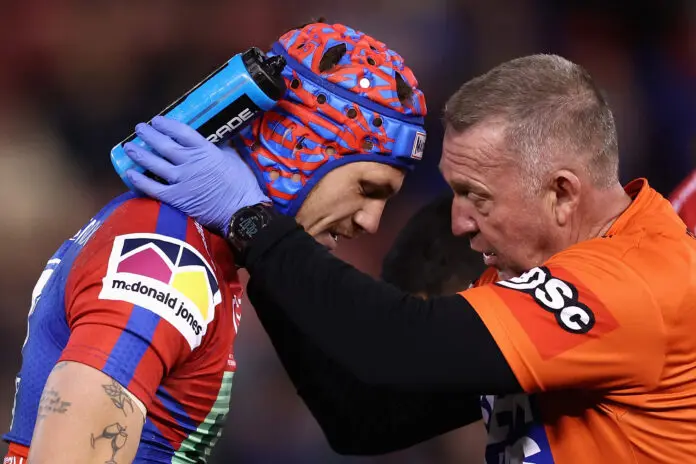Would a rival club still pay a star seven figures per season if they were aware of their concussion history?
While names like Kalyn Ponga and Luke Keary prove to be the poster boys for repeated concussions and long layoffs in the NRL today, there's a surprising plethora of stars that have copped their fair share of head knocks in recent years.
But if their history was made readily available to all clubs, would we still endure the bidding wars and drawn out contract sagas for certain stars?
Players like Cameron Murray, Ryan Matterson and Victor Radley have all had their fair share of head knocks, but don't come under anywhere close to the scrutiny that Ponga does with his public history.
The stance on concussions is shifting in the NRL, with the code introducing a mandatory 11-day stand-down for any player that suffered a category one concussion, while failing a HIA as a category two could also see you miss time.
More and more former players have stepped forward in recent years, revealing brain trauma and CTE diagnoses, first-hand evidence of the long-term effects of playing rugby league.
James Graham revealed he has 'dark spots' on his brain due to a long career, and will donate the organ to science to be studied.
The Daily Telegraph spoke to an anonymous General Manager of Football from an NRL club, revealing how concussions will play into recruitment.
"Every club will (seek concussion history),” the GM of football told the publication.
“If they don't, well, they're not doing their due diligence.
“We request a medical report of every player we sign and concussions will become a part of that report.
“Given the new concussion laws, you'd be naive not to think that a player with a history of concussions could suddenly be worth less.''
Christian Welch has suffered a multitude of knee reconstructions during his career as well as a torn Achilles, so would his market value change if he'd never suffered a season-ending injury?
The same logic will be applied to those who've suffered multiple concussions in their careers, which in turn makes them more susceptible to suffering more head knocks from less contact.

However, there's a key difference between a concussion and a knee injury, which is why clubs are fighting to have a form of salary cap dispensation for players sidelined with a head injury.
While Welch's repeated knee injuries may lower his value, he's permitted to play through the pain if he can do so. There's nothing stopping any player from playing through an injury - unless it's a head knock.
Adam Doueihi is bravely playing on despite battling 'turf toe', making it painful to run at full pelt, yet there are no NRL guidelines stopping him. The game doesn't dictate how long he's sidelined for, he does, and the club does.
Hence why clubs want dispensation if a player does cop a head knock and is forced to sit out. Any category one concussion suffered in a preliminary final this year will mean the player is ruled out of the grand final.
While only a select few players have succumbed to the new guidelines, it's a matter of time until it does create issues when finals roll around and coaches declare their players fit, only to be stood down by the new rules.






